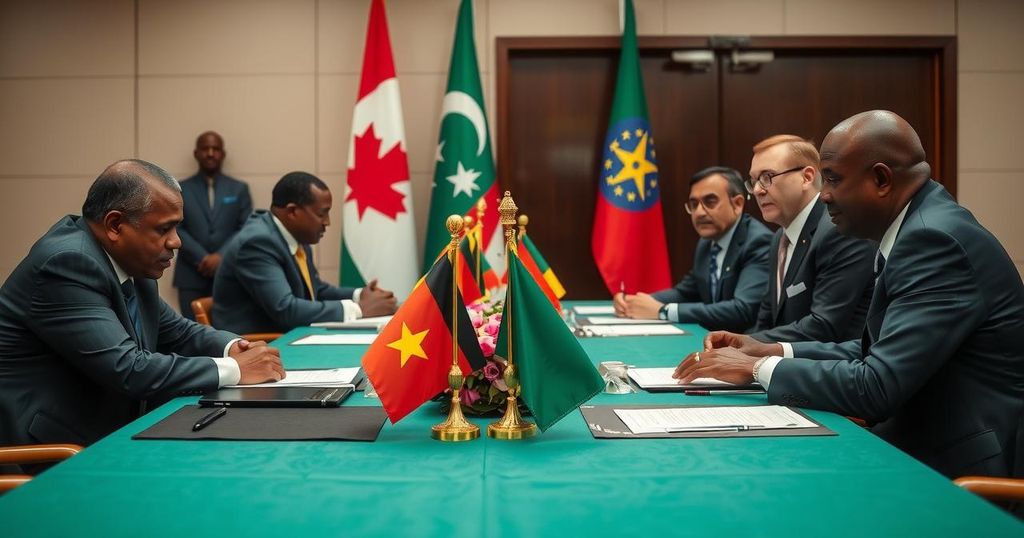Somalia’s President Hassan Sheikh Mohamud is visiting Ethiopia to reinforce a recent peace deal aimed at calming tensions in the Horn of Africa. The visit comes after a controversial agreement between Ethiopia and Somaliland that sparked outrage in Somalia. Although the peace deal mediated by Turkey offers a path forward, unresolved issues about Ethiopia’s aspirations and regional dynamics persist, as highlighted by strengthened military ties among Somalia, Egypt, and Eritrea.
On Saturday, Somalia’s President Hassan Sheikh Mohamud is set to visit Addis Ababa, the capital of Ethiopia, as part of ongoing diplomatic efforts to foster peace following a recent agreement aimed at alleviating tensions in the Horn of Africa. Ethiopia’s long-held aspiration for access to the sea has intensified its historical grievances with neighboring countries, most notably Somalia. Tensions flared when Ethiopia entered a controversial deal last year with Somaliland, a breakaway region of Somalia, which was perceived as a bid to acknowledge its independence in return for access to a strategic port and military presence on the Red Sea.
However, the impending visit follows a peace agreement brokered last month with Turkey’s assistance, which aims to mend relations between the two nations. Mohamud’s office announced that this visit underscores a commitment to renewed cooperation in the wake of the Ankara agreement. Although this diplomatic overture is a step forward, significant uncertainties remain regarding Ethiopia’s potential access to the sea and the implications of its arrangement with Somaliland.
Furthermore, tensions involving Ethiopia were evident during a recent meeting in Cairo, where Somalia’s Foreign Minister Ahmed Moalim Fiqi conferred with his Egyptian and Eritrean counterparts. The three nations have increasingly allied against Ethiopia’s regional ambitions, with Egypt’s Foreign Minister Badr Abdelatty asserting that “The Red Sea and its security is subject only to the will of the countries on its coast, and it is absolutely unacceptable for any country not bordering the Red Sea to have a presence, whether military, naval or otherwise.”
Egypt and Somalia have also strengthened military collaboration, evident by the inclusion of Egyptian troops in the newly formed African Union Support and Stabilization Mission in Somalia (AUSSOM), launched this month. This development highlights the complexities of the regional dynamics as both Somalia and Ethiopia navigate their relationships amid historical grievances and geopolitical aspirations.
The geopolitical landscape in the Horn of Africa has been increasingly characterized by rivalries and competing interests, particularly between Ethiopia and Somalia. Ethiopia’s need for coastal access has historically fueled tensions, particularly highlighted by its engagement with Somalia’s breakaway region of Somaliland. The diplomatic thaw initiated by a recent peace agreement signifies an effort to address these conflicts. The involvement of Turkey as a mediator underscores the significance of international diplomacy in the region. Moreover, recent meetings between Somalia, Egypt, and Eritrea indicate a growing coalition among neighboring countries in response to Ethiopia’s ambitions.
In summary, Somalia’s President Hassan Sheikh Mohamud is visiting Ethiopia to strengthen the newly signed peace agreement, which aims to address longstanding tensions in the region. Despite positive diplomatic moves, significant questions about Ethiopia’s access to the sea and the fate of its relationship with Somaliland remain. The evolving situation indicates ongoing complexities in regional relationships, especially with Egypt and Eritrea forming a coalition against Ethiopia’s ambitions. The road towards lasting peace in the Horn of Africa continues to be fraught with challenges.
Original Source: www.citizen.digital






